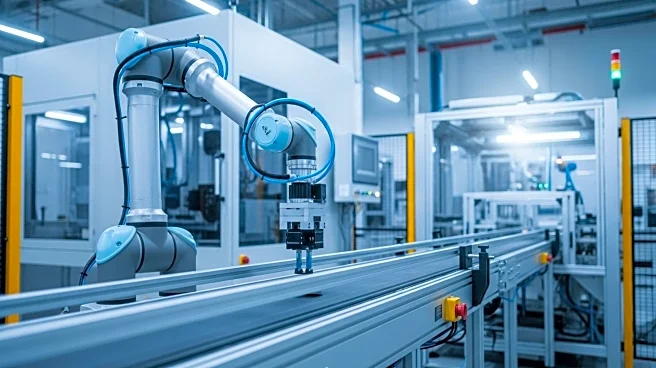What's Happening?
IndustryWeek's latest review highlights several key developments in the manufacturing sector, focusing on the integration of artificial intelligence (AI) with lean manufacturing processes. The review discusses how AI can enhance lean transformations, although it is not a standalone solution. It emphasizes the importance of a deliberate and testable framework for incorporating AI into lean activities. Additionally, the review covers various topics such as the revitalization of a brownfield site in Buffalo, New York by a battery manufacturer, and the role of foreign-born workers in maintaining the U.S. industrial workforce. The publication also addresses safety culture in manufacturing, the importance of continuous improvement, and the challenges posed by increased union activity.
Why It's Important?
The integration of AI into lean manufacturing processes is significant as it offers potential improvements in efficiency and productivity within the industry. By enhancing lean transformations, AI can help manufacturers optimize operations and reduce waste, which is crucial for maintaining competitiveness in a global market. The focus on safety culture and continuous improvement highlights the industry's commitment to protecting workers and ensuring sustainable practices. Furthermore, the discussion on union activity and immigrant workers underscores the evolving labor dynamics in the U.S., which could impact labor relations and workforce availability. These developments are vital for stakeholders in the manufacturing sector, including businesses, policymakers, and workers.
What's Next?
Manufacturers are likely to continue exploring AI applications to further enhance lean processes, potentially leading to more widespread adoption of AI technologies in the industry. As companies adapt to increased union activity, they may revise labor relations strategies to address worker concerns and maintain operational stability. The role of immigrant workers will remain a critical factor in workforce planning, influencing policy decisions and industry practices. Stakeholders will need to monitor these trends closely to navigate the challenges and opportunities they present.
Beyond the Headlines
The integration of AI into manufacturing processes raises ethical considerations regarding job displacement and the need for workforce retraining. As AI technologies become more prevalent, manufacturers must address potential impacts on employment and ensure workers are equipped with the necessary skills to thrive in an AI-enhanced environment. Additionally, the focus on safety culture reflects broader societal values around worker protection and corporate responsibility, which could influence public perception and regulatory actions.










